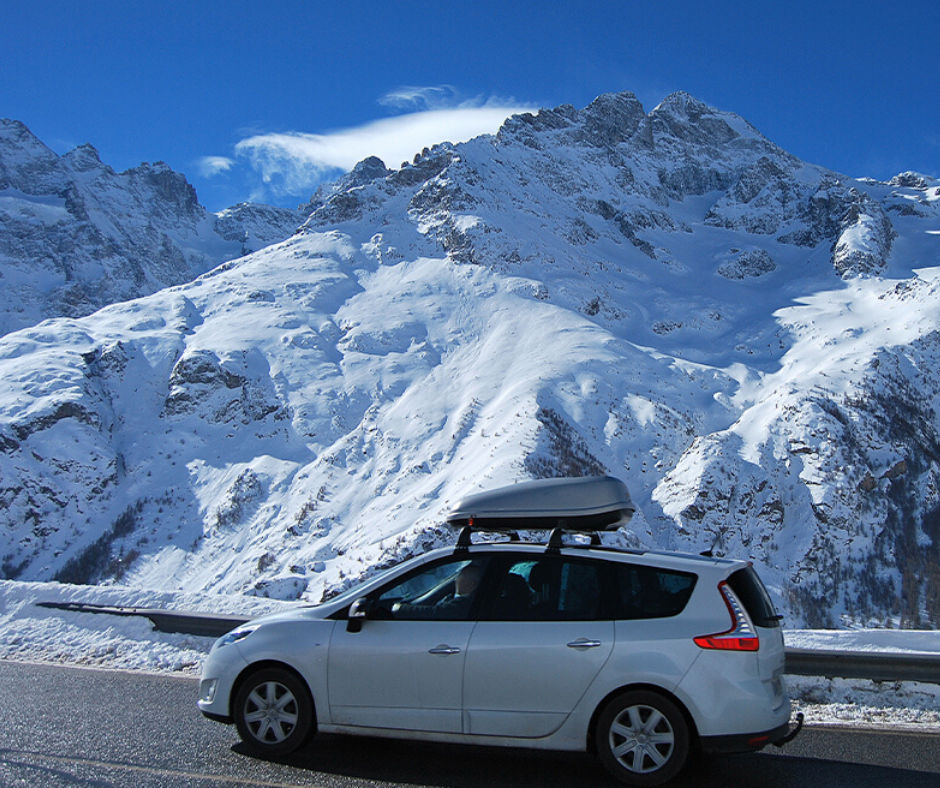
Are you planning your next ski holiday to the French Alps? While flying is a common option, driving to the Alps offers a unique and often more rewarding experience. This comprehensive guide is your ultimate resource for planning a self-drive ski trip from the UK to the French Alps.
We’ve packed it with invaluable tips and information, drawing on our expertise as the self-drive French Alps specialist, to ensure your journey is as smooth and enjoyable as possible. Look out for insider tips from our clients too! From route planning and vehicle preparation to entertaining children and packing essentials, we’ve got you covered. Get ready to hit the road and discover the magic of a self-drive ski holiday.
What's in this guide?
- What are the benefits of driving to the Alps?
- Choosing your route
- Popular routes
- Closest ski resorts to Calais
- Crossing the channel
- Planning your itinerary
- Stopping overnight
- Other stops
- Vehicle preparation
- Winter tyres, snow chains and snow socks
- Vehicle insurance and breakdown cover
- Parking in resort
- What to pack
Car essentials
Ski gear
Documents
Home comforts - Costs to consider
- Money saving tips
- Driving tips
- EV tips
- Travelling with children
- The return journey
- Your self drive ski holiday
1. Make the journey part of your ski holiday
Opting to drive to the Alps is a great way of making the holiday start the moment you leave your front door. Combining a road trip with your ski holiday can add to the fun and overall excitement.
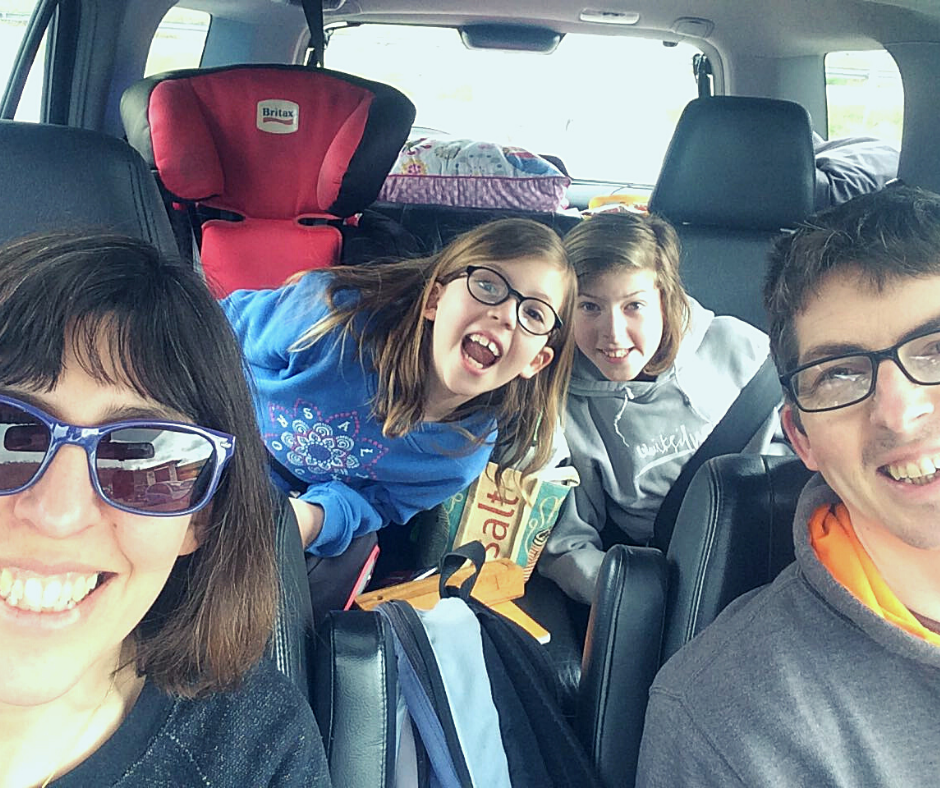
The excitement starts the minute you get on the road
2. Scenic route
By taking the car you can drive to the Alps however you like. You can take the most direct route using the convenient toll system on the motorways, or you can opt for the scenic route and making stops in other towns and villages on the way to break up the journey.
You could even extend your winter break by adding one or two nights either side of your winter holiday in the French Alps and stay in en-route hotels, such as in Reims and Troyes.
Our blog Driving to the Alps: 10 places to stop on the way will help you make the most of your drive by giving some of our top recommendations for places to stop to extend your ski holiday - from theme parks to shopping outlets, scenic spots to historic sites and everything in between.
3. Pack everything but the kitchen sink
Not only are you able to travel door to door without any transfers, long check-in processes or waiting for hours in airport lounges, you also don't have a limit on your luggage!
You can pack all manner of things for your break in the French mountains. Take as much or as little as you need (including your skis/snowboard, ski boots, sport/leisure equipment, sledges, all at no extra cost).
Your home comforts can come with you too - including your slow-cooker (to make self-catering a breeze), and your children's favourite toys! Later in this guide we will give you all our top tips for what to pack for your next self-drive ski holiday.
4. Enroute shopping
You can take advantage of picking up some snacks or even stocking up on your favourite French foods in the supermarkets along the way. This works out a lot cheaper than shopping in the smaller markets in the resort and there's a lot more variety too! Some of our clients even bring a few store cupboard essentials from home.
5. Cost-effective
Driving to the French Alps can be a cost-effective alternative to flying, especially in school holidays when flights can be at a premium. Here at Peak Retreats, our ski holiday accommodation packages include a return Eurotunnel LeShuttle crossing for a standard car with a free FlexiPlus upgrade, except on some school holiday weeks.
A standard car can hold up to 8 passengers at no additional cost – you just pay once for the vehicle. Fuel and tolls can be expected to be between €150 and €250 depending on where in the UK you are based, which ski resort you are travelling to and the fuel economy of your vehicle.
6. Explore beyond your resort
For those that like to explore beyond their resort while on a ski holiday, having access to your own vehicle is a winner. If you fancy a break from the slopes and want to explore the region, all you have to do is hop in your car and off you go!
7. Take the dog (if you want to!)
No one wants to leave a member of the family behind when going away, so the fact that lots of the accommodation we offer (see our ski holidays with dogs page) accept pets makes it so much easier to include everyone in a holiday in the French mountains!
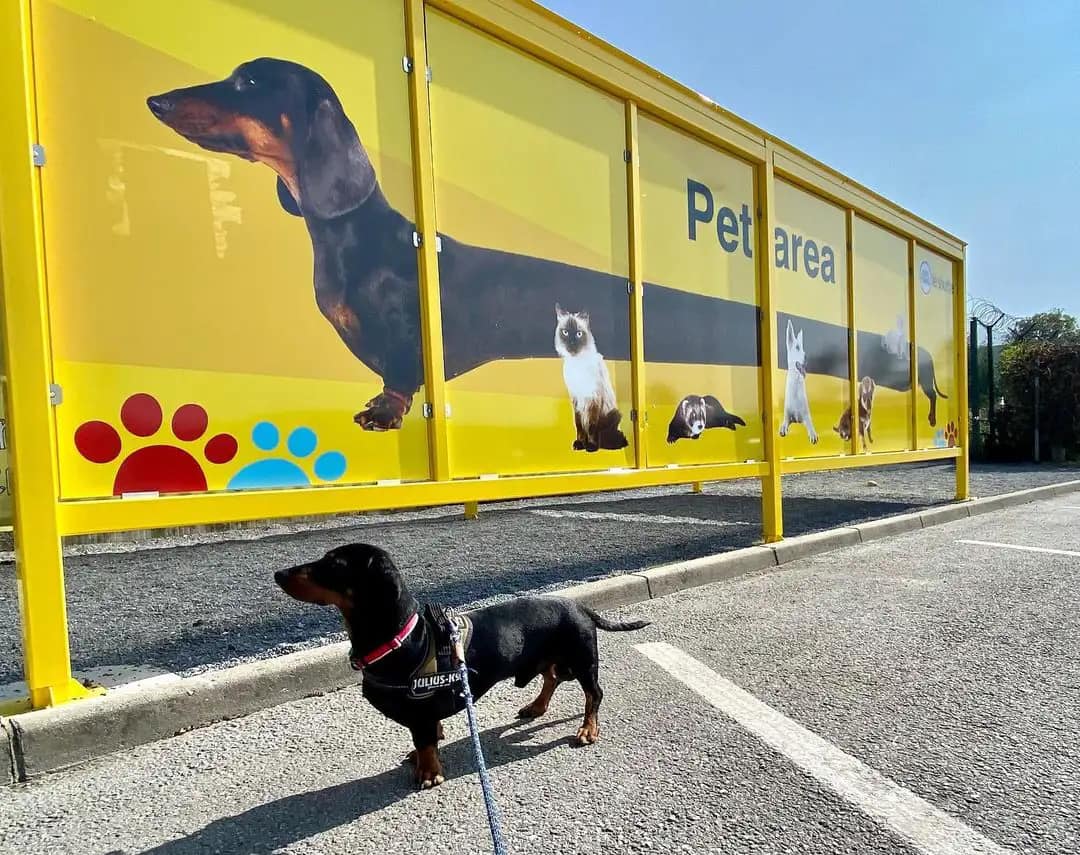
This can be facilitated by opting to cross the Channel with Eurotunnel LeShuttle. All you have to do is add on a pet supplement to your Eurotunnel LeShuttle journey (applicable to dogs, cats and ferrets).
What else do you need to know about travelling via Eurotunnel with your pet?
- Travel between 06:30-23:30 to use this service
- Your dog can remain in the car with you during the crossing
- There's a dedicated exercise area at the terminal
- Registered guide/assistance dogs travel for free
Planning and preparation
Planning your route in advance is vital for a smooth journey to the French Alps by car. Don’t forget to plan your route to the Tunnel or ferry terminal as well as the drive to your ski resort once you arrive in France.
We have found the Via Michelin route planner to be the best option and it also handily helps you estimate tolls and fuel costs based on your vehicle make and model.
The route you choose from northern France down to the Alps will depend which resort in the French Alps you are going to and your personal preference. Consider what your priorities are: do you want to get there as quickly as possible? Avoid tolls? Take the scenic route?
Tip: on French motorways, there are emergency telephones every 2km, resting areas every 10-20kn, and petrol stations approximately every 40km. Motorway radio (with traffic alerts in English at set times) is found at 107.7km.
Here are some popular routes from Calais to the French Alps. We’ve chosen Chamonix as an example resort. Routes and times will vary according to which resort you are travelling to plus your speed and the traffic conditions on the day.
Quickest route from Calais to French Alps: 517 miles, 8 hours, 57 minutes
Calais > Arras > Laon > Reims > Troyes > Dijon > Geneva > Chamonix
Shortest distance from Calais to French Alps: 505 miles, 9 hours, 48 minutes
Calais > Arras > Reims > Chaumont > Dijon > Geneva > Chamonix
Route from Calais to the French alps avoiding tolls: 536 miles, 12 hours, 8 minutes
Calais > Lille > Valenciennes > Landrecies > Laon > Reims > Chaumont > Besançon > Lausanne > Montreux > Chamonix
Route from Calais to the French Alps avoiding motorways: 524 miles, 15 hours, 54 minutes
Calais > Arras > Laon > > Reims > Châlons-en-Champagne > Lausanne > Montreux > Chamonix
Looking to get to the French Alps as quickly as possible by car? You could consider choosing one of the resorts that is closest to Calais including Samoëns, Le Grand Bornand and Les Carroz. For a more comprehensive list, see our blog The best French Alps ski resorts near Calais.
The first route decision you’ll need to make is how you’re going to cross the English Channel. There are two main options for crossing the channel to France - Eurotunnel LeShuttle or ferry.
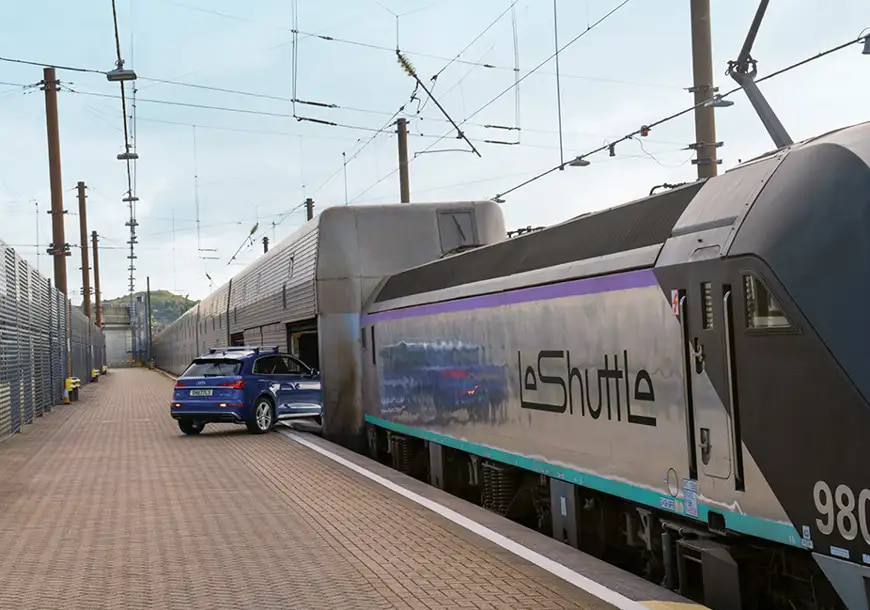
Eurotunnel Le Shuttle
Eurotunnel LeShuttle takes 35 minutes from Folkestone in Kent to Calais and there are up to 4 departures per hour. Some travellers like to opt for Le Shuttle over the ferry because it is generally significantly quicker. They drive on to the train in Folkestone, stay by their vehicle for the duration and then drive off at Calais 35 minutes later.
FlexiPlus
What is FlexiPlus?
FlexiPlus is a premium service offered by Eurotunnel LeShuttle. Here at Peak Retreats, our ski holiday packages include a return Eurotunnel LeShuttle crossing for a standard car and we give you a free upgrade to the premium FlexiPlus service, except at some school holiday weeks.
What are the benefits of FlexiPlus?
- You have your own dedicated check-in lane
- FlexiPlus travellers have priority boarding
- You have flexible travel times on the day of travel booked
- You are placed on the next available crossing when you arrive at the terminal
- There is an exclusive FlexiPlus lounge, with plenty of complimentary drinks and snacks for the journey
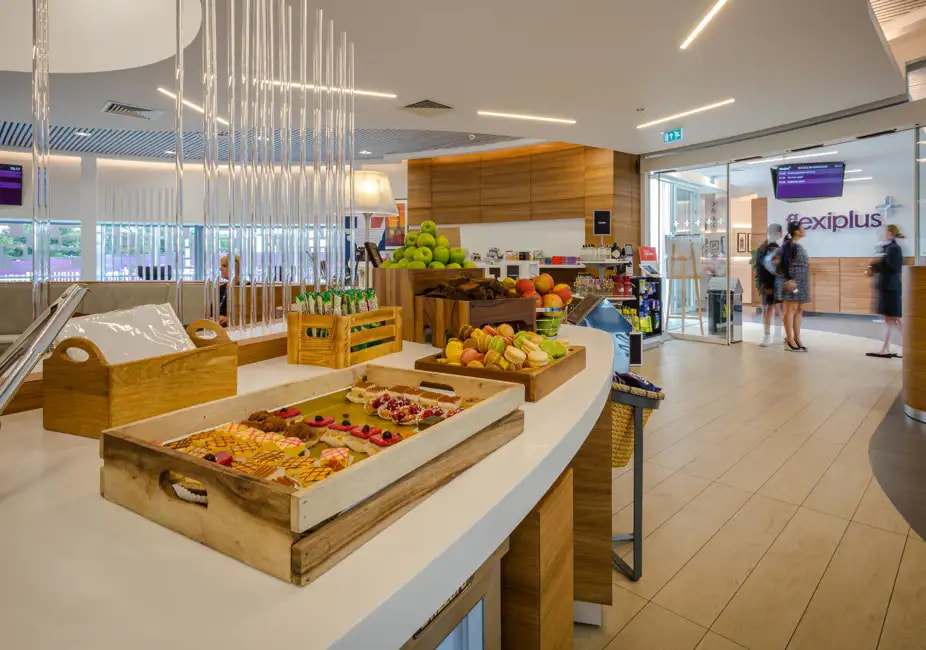
It’s easy to see why FlexiPlus travel is so beneficial and why we recommend it! You can take any stress out of your journey as you have no tight deadlines to meet with the crossing, just rock up on your booked day of travel and you'll drive straight on to the next available crossing! The whole check-in system is automated too, meaning you don't even need to leave the comfort of your vehicle when you arrive at the terminal.
Ferry
Some people opt to take the ferry either because they live in close proximity to a ferry port or because they enjoy the experience of being on the ferry and make it part of their ski holiday.
There are a number of ferry route options and carriers from the UK to France, including:
- P&O – Hull to Rotterdam or Dover to Calais
- DFDS – Dover to Calais or Dover to Dunkirk
- Brittany Ferries – Portsmouth to Caen, Portsmouth to St Malo, Portsmouth to Cherbourg, Portsmouth to Le Havre, Poole to Cherbourg or Plymouth to Roscoff.
Which you choose will depend on your location in the UK, your budget and which ferry times are favourable as well as if you have any driving route preferences once you arrive in France.
Eurotunnel vs ferry to France?
Whether you opt to take the Eurotunnel to France or a ferry will depend on personal preference and perhaps your proximity to ports in the UK. If you book a package with Peak Retreats, we include a standard return Eurotunnel crossing (with free upgrade to FlexiPlus on non peak weeks) or we can book ferries too.
Tip: for safety reasons, your fuel tank should be no more than three quarters full when boarding the ferry or Eurotunnel. LPG vehicles are not accepted on Eurotunnel.
It’s worth planning your travel itinerary in advance including plotting your route, deciding whether you will stop overnight enroute and accounting for any other stops you might like to may.
Tip: view traffic forecasts on www.bison-fute.gouv.fr to help you plan the timings of your drive.
Don’t forget to let your accommodation know your estimated time of arrival in advance.
Whether you choose to stop overnight somewhere on the way to or from the French Alps is entirely personal preference. Some of our clients live near the LeShuttle or a ferry port in the UK and therefore decide to do the drive in one. Others may live a bit further away or just prefer to take their time.
One benefit of driving overnight if you have children is that they might sleep most of the way. But do bear in mind that you need sleep too! You know yourself best and if you are likely to feel sleepy on a nighttime drive or find it hard to recover afterwards, you’re probably better to book an enroute hotel. We have a number of recommended stops which are in convenient locations on the way to the French Alps. This includes hotels in Reims and Troyes.
Alternatively, you might wish to make your stop an extension of your holiday. Some of our clients choose to extend their trip with visits to the likes of Disneyland, a city break, or a vineyard escape.
At Peak Retreats, we offer Enroute Escapes, a unique concept to help you make the most of your time in France. These special experiences allow you to explore more of France and offer a sense of escapism, whilst still being conveniently located just a short drive from the main routes from Calais to the Alps. Ideal for prolonging your trip and elevating your journey!

Regardless of whether you are going to stop overnight, you’ll definitely be needing to stop to refuel, use the rest facilities and stretch your legs. This might be a 15 minute stop at a service station or perhaps you like to take your time and stop at the odd scenic spot for a picnic along the way.
One of our favourite places to stop is Le Village Outlet which is 30 minutes from Lyon and seconds off the main motorway. Not only is it great for shopping your favourite luxury brands, it also has lots of lovely green areas to stretch your legs and even a children's playground to allow them to let off some steam before starting your drive up to your resort.
Tip: fuel is usually sold as SP98 or SP95 or SP95 E10 (SP = sans plomb i.e. unleaded) and diesel (gazoil).
If you really want to make the journey part of your holiday, check out our blog Driving to the Alps: 10 places to stop on the way.
Our other top tip is to make sure you stop at a large supermarket before heading up to your self-catered ski apartment. Not only will this save you time and money on shopping in the resort, there’s also the added bonus of being able to stock up on all your favourite French flavours: wine, croissants, cheese, and other delicious regional and local products. Yum!
It’s always worth ensuring that your vehicle is in a roadworthy condition when embarking on any long journey including checking your tyre treads, engine fluids and lights.
The Met Office have a good checklist of vehicle checks to make before long journeys.
When embarking on a drive from the UK to the French Alps, it is essential that you prepare for winter weather conditions. This includes ensuring that your vehicle can handle potentially icy or snow-covered roads. This is easily solved by making sure you have either:
- Winter tyres
- Snow socks
- Snow chains
It is compulsory to have winter tyres or carry snow chains in mountainous areas in France between 1st November and 31st March for at least 2 powered wheels.
Failure to carry them is likely to result in a fine if caught and if you are involved in an accident where snow chains should have been used, you will automatically be deemed liable. We do recommend you carry them outside of these dates as a precaution though.

Winter tyres vs snow chains vs snow socks
So which option should you choose: winter tyres, snow chains or snow socks? It can be a bit overwhelming at first so we’ve created this handy table to help you compare the three options...
| Feature | Winter tyres | Snow chains | Snow socks |
| Purpose | Year-round winter grip | Extreme snow/ice conditions | Temporary snow/slush assistance |
| Effectiveness | Excellent for all cold-weather driving | Best in deep snow or ice | Moderate, works for light snow |
| Ease of use | Installed on wheels in advance | Requires manual fitting (some practice required) | Quick and easy to fit |
| Legal requirement | Compliant in snow zones | Mandatory to carry if needed | May not be legally sufficient |
| Speed limits | No specific limit | Limited to 30km/hour or slower | Limited to less than 30km/hour |
| Cost | High initial cost | Moderate cost | Low cost |
Pros and cons
Winter tyres
Pros – ideal for consistent use throughout winter, improves overall safety, no need to stop for fitting
Cons – expensive initial investment, requires seasonal tyre changes, may therefore not be viable for one weeks’ ski holiday per year
Note: winter tyres must be stamped with 3PMSF (three peaks mountain snowflake) AND marked with one of either 'M+S', 'M.S' or 'M&S'.
Snow chains
Pros – superior grip on thick snow and ice, required in extreme conditions, highly compatible with mountain roads
Cons – getting the hang of fitting them can take a little practice. Check out our guide How to fit snow chains in 3 steps to get started.
Snow socks
Pros – Budget-friendly, lightweight, easy to store and fit
Cons – less effective than snow chains, not suitable for prolonged use or heavy snow
Note: most common snow chain/snow sock sizes are available in local garages and larger hypermarkets in mountain regions in France or you can buy these in advance through snowchains.com.
Remember that you may not be automatically insured to drive in Europe with your current car insurance policy. Always check your policy wording carefully to check levels of cover and also whether you are covered for mountain roads.
Likewise, not all breakdown policies cover you when taking your car abroad. If you aren’t covered by your policy, you can consider upgrading your breakdown policy to one that covers you for driving in France, or alternatively you may find that a single-trip breakdown policy is better for you.
Make sure you check parking arrangements for your chosen accommodation in resort. Lots of accommodation has underground parking, but not all. Some works on a first come, first-served basis, others are pre-bookable.
A tour operator like Peak Retreats will be able to advise you on parking, whether there is a charge and if necessary, reserve you a parking space.

Being organised with your packing for your self-drive ski holiday will pay dividends later. We have split this section into four sections – car essentials, ski gear, documents and home comforts.
-
Stick on headlight deflectors
-
Ice scraper
- UK car sticker for Europe
- De-icer
- Warm clothes
-
High vis jackets/vests
-
Warning triangle
-
Bulb kit
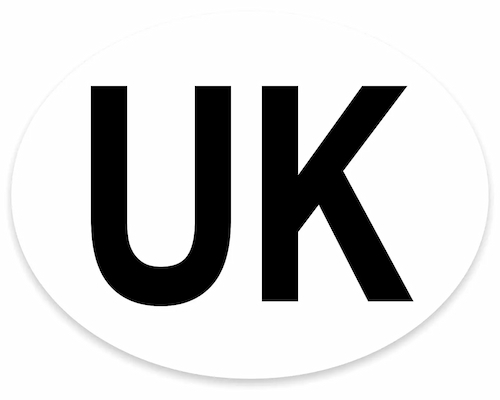
-
All the snacks – think fruit, crackers, granola bars, sausage rolls or sandwiches/wraps
-
Plenty of easily accessible drinks/water
-
Euros including lose change
-
Car phone charger
-
Kids’ games and entertainment – such as magnetic board games, mess free colouring and sticker books - see the 'travelling with children’ section below for more ideas
-
Fully charged and loaded ipads and headphones (if you choose to go down the screen route for entertaining children)
-
Skis or snowboard (not compulsory – hire skis are fine)
-
Ski or snowboard boots (if you like your own fitted boots)
-
Helmet (these can be easily and inexpensively hired)
-
3 x ski socks
-
3 x resort trousers
-
2 x sports bras (for women)
-
2 x baselayer tops
-
2 x baselayer bottoms
-
1 x neck gaiter/buff/snood
-
2 x fleeces or wool jumpers
-
1 x ski jacket
-
1 x ski salopettes
-
1 x pair of ski gloves or mittens
-
1 x pair of resort gloves
-
1 x ski goggles
-
1 x sunglasses
-
1 x swimming costume
-
1 x sunscreen
-
1 x lipbalm
-
1 x woolly hat
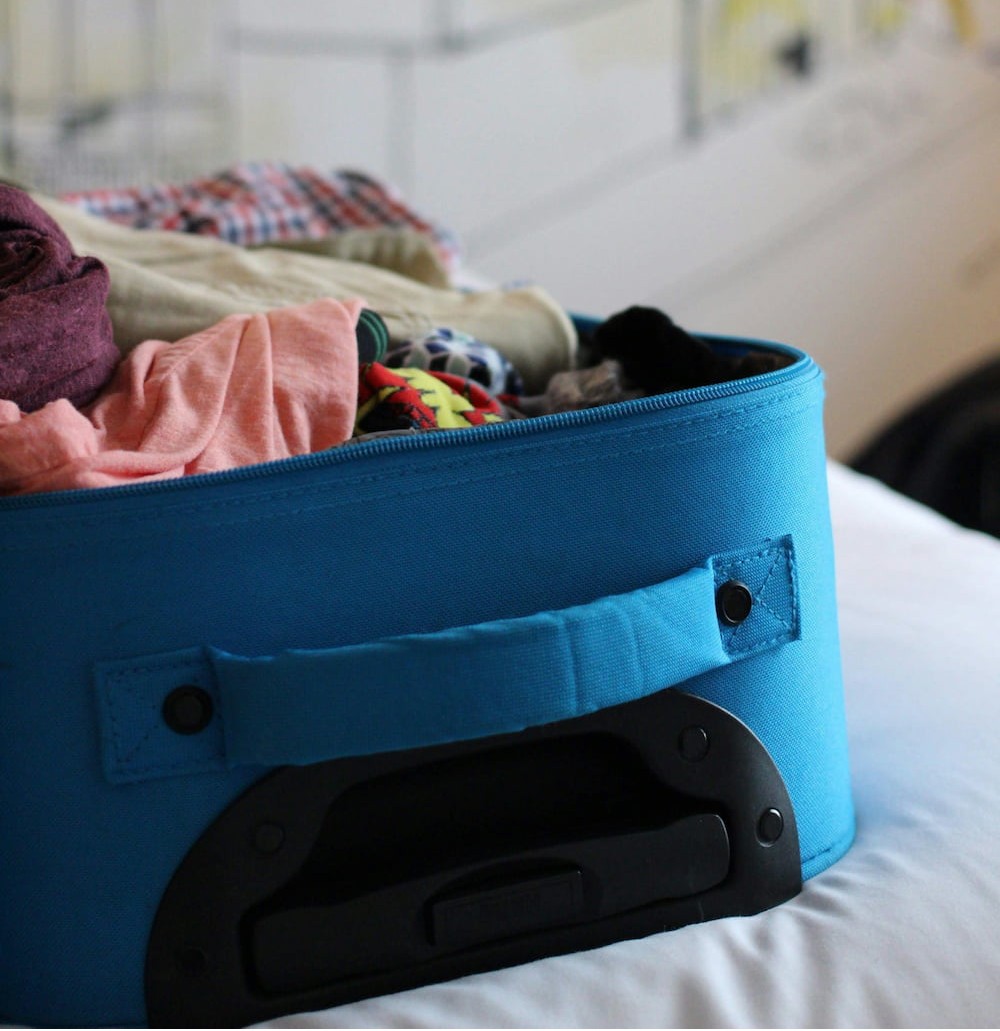
Having the right documentation with you on your self drive ski holiday is imperative. Here are the documents we suggest you have to hand in your vehicle but there may be additional documents that you need:
-
A passports for each member of your party
-
Driving licence for any drivers
-
Car insurance documents
-
Breakdown cover documents
-
Vehicle registration document
-
Eurotunnel/ferry documentation
-
GHIC card (UK Global Health Insurance Card replacing the EHIC European Health Insurance Card).
One of our favourite reasons to opt for a self-drive ski holiday is that you don’t need to leave the home comforts at home! Here are just some of our favourite items to pack that will add a little more convenience and comfort to your ski holiday.
-
Slow cooker – for instant meals from the piste
-
Bluetooth speaker – to play the holiday tunes
-
Reusable water bottles
-
Board games or card games
-
Snuggly blanket
-
Air fryer
-
Diffuser – for a smell of home
-
Oil and basic herbs/spices
-
Your favourite condiments
-
Reusable food storage containers – for leftovers or a picnic on the piste
Note: meat, milk or their products cannot be taken into the EU.
The costs associated with driving to the French Alps are as follows:
-
Fuel
-
Tolls
-
Channel crossing (don’t forget you get a return Eurotunnel Le Shuttle crossing with any package booked with Peak Retreats)
-
Enroute hotel(s) if you choose to stop over night
-
Snow chains or similar (a one-off cost if you buy them)
-
Parking
Despite these costs, driving is usually cheaper than flying to the French Alps, especially if you have more than 2 people in your party and if you are travelling in school holidays.
When comparing the cost of flying to the Alps, don’t forget to factor in:
-
The cost of getting to the airport/airport parking
-
Possible airport hotel
-
The flight
-
Additional fight related costs such as baggage, choosing your own seat
-
Car hire or airport transfer to resort
Money saving tips
Pack a picnic! Rather than buying food along the route, taking a picnic can be a definite cost-saver. Better to spend your pennies on yummy food in the resort. You could even take food flasks with pre-heated food in if you fancy a hot meal on your drive.
When choosing an enroute hotel, consider staying just outside a major town. Town or city centre hotels invariably carry a premium price tag. Opting to stay in more of an ‘enroute’ style hotel not far from the motorway can save you money.
Consider a moderate driving speed, slightly below the speed limit to maximise fuel efficiency. This may not make a huge difference to your arrival time but your wallet may thank you.
The Journey
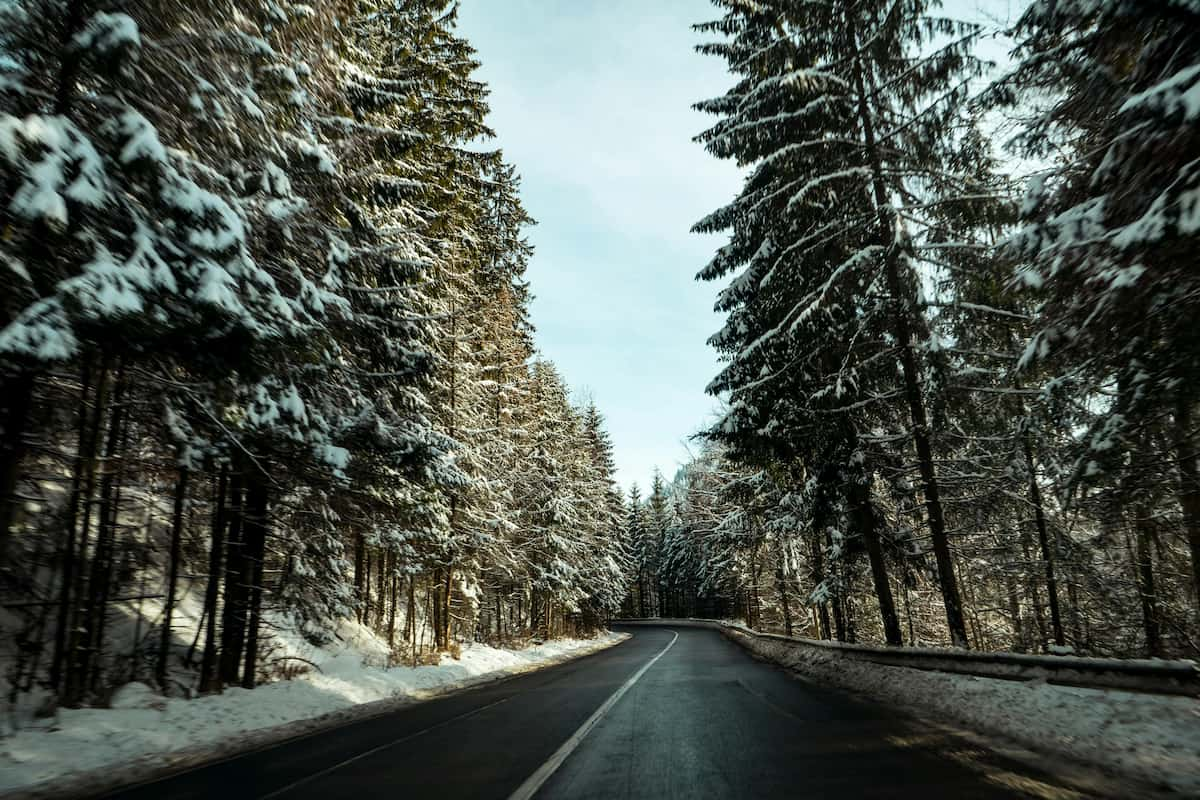
Driving to the French Alps ©chetanvlad
Driving to the Alps from the UK has lots of benefits and can be a lot of fun. Our driving tips will help keep you safe and get the most out of the drive.
1. Avoid fatigue
The most important thing to consider when driving to the Alps is safety. Make sure you take regular rest stops and if possible, share the driving.
2. Observe speed limits
France has different speed limits to us and all speed limits are denoted in kilometres. Make sure you closely monitor the speed limit and adjust your speed accordingly. As a general guide, their speed limits are as follows:
-
Motorway – 130km/h (approx 80mph)
-
Dual carriage ways – 110km/h (approx 70mph)
-
A and B roads – 80km/h (approx 50mph)
-
Built up areas – 50km/h (approx 30mph)
Please note: speed limits are reduced in France due to changes in driving conditions such as rain. For example the motorway speed limit is reduced to 110km/h in wet or snowy conditions and 50km/h in fog.
3. Get a toll tag in advance
To make things even easier you can sign-up online for an automatic toll payer, meaning you drive straight through fast lane of the tolls without having to queue up and pay. The Emovis tag is useful as you can use it any time you drive in France.
4. Driving in the Alps: winter driving tips
It’s worth doing your homework and being familiar with driving techniques for snowy and icy conditions. Here are our top tips:
-
Increase following distance by as much as 10 times the normal gap
-
Accelerate and break gently to avoid skidding
-
Maintain low revs, moving to a higher gear as quickly as possible to maintain better traction EXCEPT
-
When travelling downhill, use engine breaking in a lower gear rather than the break pedal where possible
-
Pull away in second gear to reduce wheel slip
-
If you do skid, take your foot off the accelerator and steer into it gently
5. Navigating mountain roads:
-
Use engine breaking - gear down when driving downhill to control speed and prevent brakes overheating
-
Use extra caution when approaching blind corners
-
Accelerate gently to maintain good control of the vehicle
-
Keep to your side of the road – it sounds obvious but needs extra attention when driving on the other side of the road
-
Fuel in advance – the last thing you want to happen is to run out of fuel in the mountains. As petrol stations can be few and far between, it’s sensible to refuel before you embark on your ascent
-
Take hairpin bends slowly – you are likely to encounter quite a few so take them at your own pace and stick to the inside of the bend
-
Use passing laybys to pull over and let faster traffic past when it is safe to do so
Top tips for driving an EV to the Alps for skiing
Driving an electric vehicle (EV) to the Alps can be a smooth, cost-effective, and eco-friendly way to start your skiing holiday. With a little planning and some helpful hacks, your journey can be stress-free, even on long drives.
1. Maximise charging stops along your route
The key to an efficient EV road trip is choosing the right stops. For example, on the way to the Alps, there are dozens of great charging stations along the main motorways.
Also, get off on the right foot by arriving at the Eurotunnel terminal 30 minutes earlier to charge before you board the train. That way, when you get off on the other side, you can hit the road running with a full charge.
2. The first 10 minutes are vital
When you stop to charge, jump out and plug in as soon as you arrive. The first 10 minutes of charging an EV can add up to 25% of the charge, so while other passengers are waking up or preparing to get out, your car can be filling up at speed.
3. Avoid pairing chargers
Some charging stations pair chargers together, meaning that two cars parked next to each other might share power. To maximise charging speed, park one charger away from another to avoid sharing power and ensure a faster charge.
This might be an old wives' tale, but it was certainly true on the Tesla network!
4. Recalibrate your navigation
If your EV is being too conservative with its charging suggestions, try stopping the navigation and re-inputting your final destination while on the move. The system will often recalibrate, directing you to a farther charger, which could save you time and reduce the overall number of charging stops.
5. Check charger availability in advance
Use apps or your car’s navigation system to check charger availability before you arrive. This can help you avoid busy chargers and find less crowded ones, potentially reducing your wait time and even the cost. For example, Tesla charges more at busier stations, so locating a quieter charger could save you money—albeit not enough to pay for your holiday!
6. Free hotel charging
If you plan to stop overnight on the way down or back, many hotels offer free car charging, so it's worth checking in advance. A £70 per night hotel could get you £10-30 worth of car charging included.
7. Your best cuppa
Not specific to EVs, but pack a flask of hot water with your favourite coffee or tea. Service station hot drinks don’t leave much to be desired, so being able to make a decent cuppa while charging can be a godsend. And if you really want to save cash, packed food will save you pounds too.
8. Cold means drain
Spoiler alert: Ski resorts are generally cold, which can drain a battery even if the car is not being used. A happy car is a charged car, so charge the car early on in your holiday and leave it parked fully charged if you're not going to be using it. This way, you won’t find the cold has drained the last bit of charge you had left when you need it most.
With these tips, driving your EV to the Alps can be a smooth and enjoyable experience. Enjoy the scenic drive and eco-friendly journey!
These tips were kindly given by Dominic Killinger of InTheSnow magazine and The Whiteout Ski podcast.
If you're travelling as a family, driving to the Alps is a great option over flying. A self-drive ski holiday gives you the flexibility to take whichever route you like, stopping for breaks when you need to, and you can remain comfortable in your own space.
Driving to the Alps can also allow children to get really excited about the holiday to come, as their surroundings change along the journey.
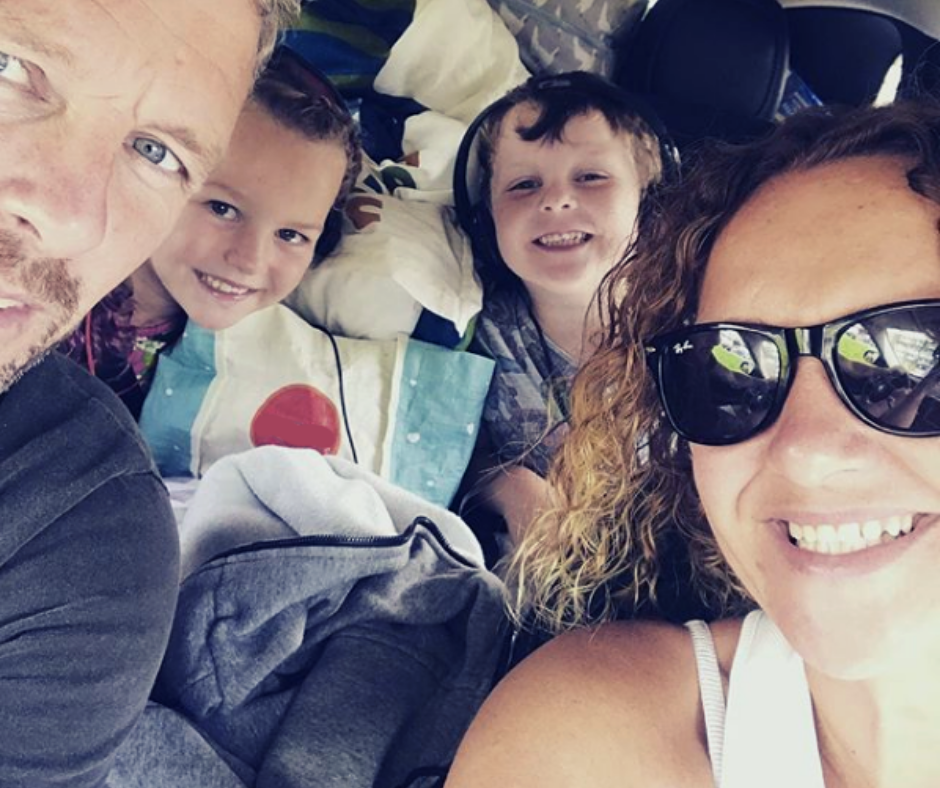
Family road trip to the French Alps
It’s not always without its challenges though, so here are some of our top tips to driving to the French Alps with kids:
-
Plan plenty of rest stops for stretching little legs and emptying small bladders – breaking the journey up into chunks will make time go quicker too
-
Play car games - download our mini guide which has 10 car game ideas to get you started
-
Pack plenty of snacks – long car journeys and hungry children don’t mix well so make sure you have plenty of snacks stashed away
-
Embrace technology – if ever there was a time to ditch the screentime rules, this might be it!
-
Create busy bags – create a little bag of activities for each child which can be tailored to their age. It could include sticker books, non messy colouring and games. The key not giving them the bag until that first boredom moment!
-
Listen to audiobooks – pick one that the whole family will enjoy. Audible has a great list of best audiobooks for family road trips.
-
Create a road trip playlist of your family’s favourite songs and have a sing along
Driving from the French Alps to the UK is pretty similar to driving to the French Alps – just in reverse.
It’s a good idea to keep an eye on the weather forecast the day before you are due to set off. This will help you plan what time you need to leave. Make sure you leave plenty of time to get to the Eurotunnel Le Shuttle or ferry terminal. Of course, if you have booked Eurotunnel FlexiPlus, you can just turn up on the day of your booking and drive straight onto the next available train.
As with driving to the Alps, embrace the journey! Plan plenty of rest stops and if desired, an overnight stay. This is the last day (and possibly night) of your ski holiday so remember to relax and take in the sights of France.
And there we have it: our ultimate guide to driving to the French Alps from the UK. Driving offers a fantastic way to begin your ski holiday the moment you leave home. From the flexibility of packing everything you need to the opportunity to explore scenic routes along the way, a self-drive ski holiday can be a fun adventure and lower cost alternative to flying to the Alps.
By following the tips and advice in this guide, you’ll be well-equipped to navigate the roads, embrace the experience, and arrive at your chosen resort ready to hit the slopes.
Here at Peak Retreats, we are self-drive specialists. If you’d like to discuss whether a self-drive ski holiday is right for you or pick our brains on the best resort or accommodation for your needs, please get in touch. Call 023 9283 9310 or email reservations@peakretreats.co.uk.
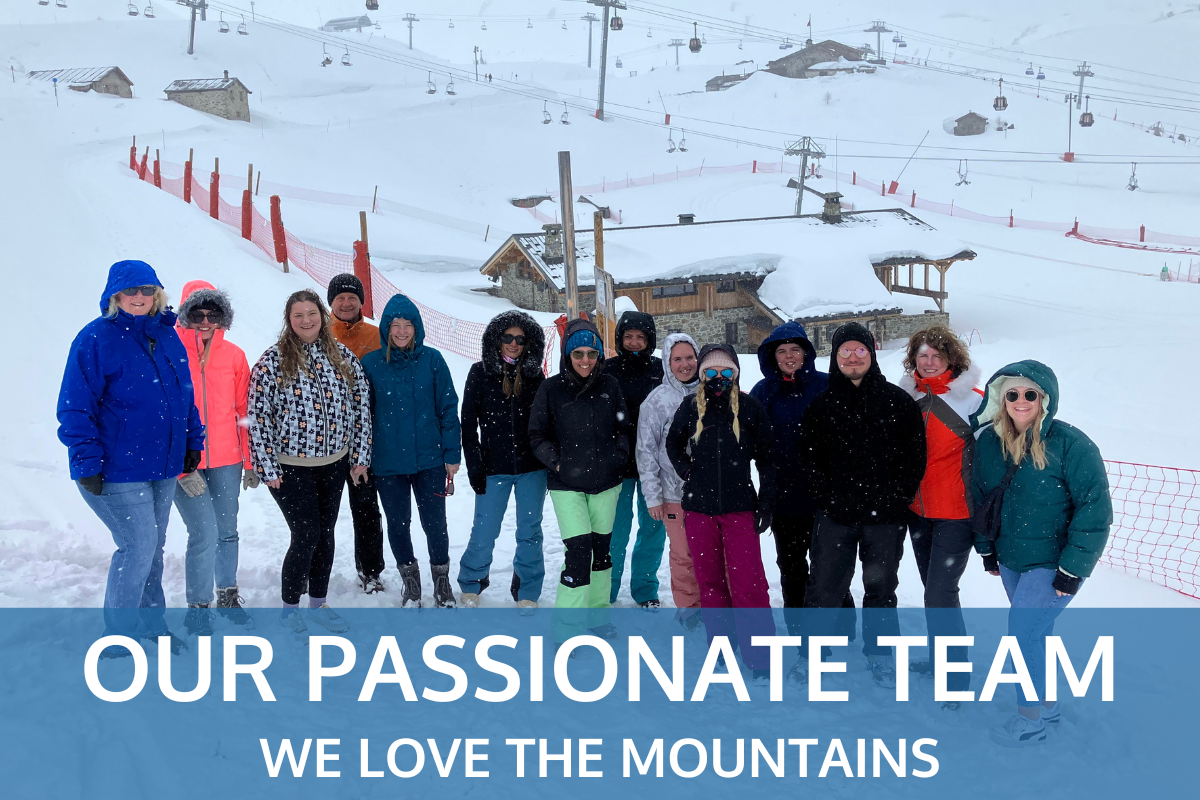
Why book with Peak Retreats?
We’re a small, UK-based team of ski experts who are here to make your holiday hassle-free. And we’re winners of the Telegraph Travel Award for Best Ski Operator 2023.
We pride ourselves on going the extra mile, from helping you navigating ski school options to offering tailored advice on the best resorts and accommodation.
Our support doesn’t end when you book. With years of experience and in-depth knowledge of the French Alps, we’re committed to ensuring your ski trip is as smooth as fresh snow.
We provide 24/7 support while you’re away, personalised info packs, and regular travel updates to keep you informed.
To get tailored advice for your next ski holiday, give us a call on 023 9283 9310 or email reservations@peakretreats.co.uk.